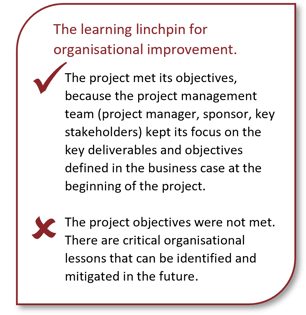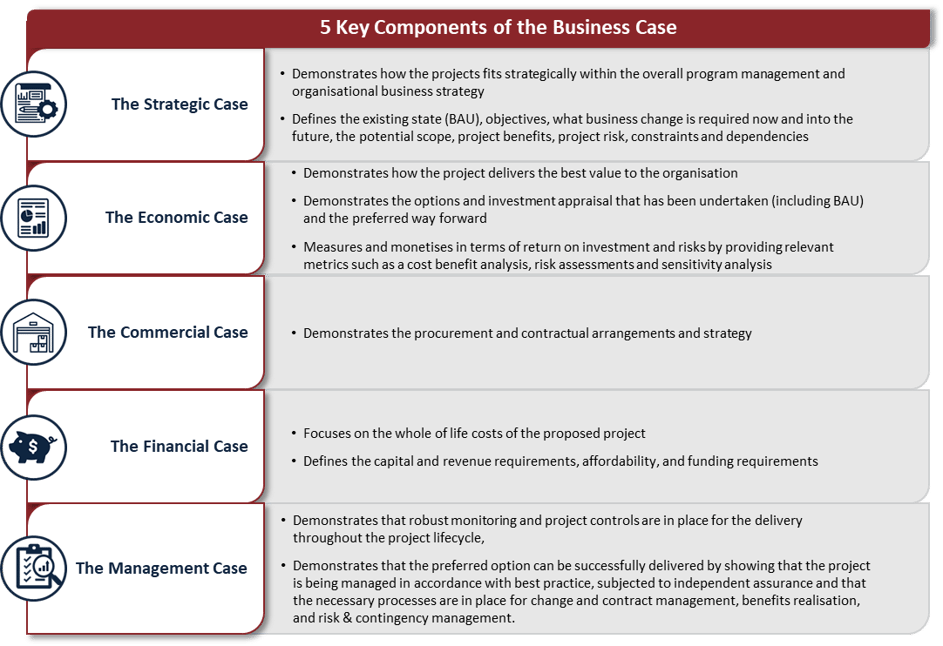Developing a Business Case
Delivering Successful Projects
The purpose of the business case is to evaluate the business benefits, cost and risk assessments of alternative options and provides a rationale for the preferred solution.
What is a business case?
A business case provides justification for undertaking a project, programme of works, or portfolio.
It describes a proposed journey from initial ideas through to maximising expected outcomes of the project success.
In project management, a well-developed and intelligently used business case is one of the most valuable tools available to your project’s stakeholders.
The quality of your business case and the processes involved in creating it, will be evident in its implementation. Impacting costs and benefits through the lifecycle of the project. While creating and sustaining it's value.
The role of the business case in Projects

The business case provides a reference point for investment decisions, project planning and a guiding light before, during, and after a project, enabling the expected benefits to be measured. It defines the purpose of the project within the corporate strategy.
When a project begins a project professional will use the business case to establish the project outcome and set up project governance, and stakeholder engagement — including the project sponsor and project manager.
As the project progresses, the business case becomes one of the key elements of the project. It provides a framework upon which all decisions and the approval process should be based.
It helps inform the project manager and defines when the projects approach may need to change, particularly when alternative technical or commercial options present themselves.
Having a defined business case process where the business case forms part of project documentation and used as a benchmarking tool will allow monitoring of business objectives and prepares the business if there is anything that is likely to detract from project delivery. After the project is completed the business case becomes the measure to assess how well the organisation did with its planning and implementation to deliver the expected outcomes.
Advantages of a project business case
A well-prepared project business case:
- enables the organisation and its key stakeholders to understand, influence and shape the project’s scope and direction during the project initiation and project definition phases
- assists decision makers in understanding the key issues, financial and nonfinancial, risks and benefits and to avoid committing resources to projects that should not proceed
- demonstrates to the project boards stakeholders, senior management, and decision makers the continuing viability of the project, and
- provides the basis for management, monitoring and evaluation during and after implementation
|
In its book ‘Building Brilliant business cases’, 2004, Gartner states “Once approved they are put away…few track the business benefits the projects actually achieve”. Bent Flyvbjerg, BT Professor and Chair of Major Programme Management at Oxford University, argues that the result is “the planned, systematic, deliberate misstatement of costs and benefits to get projects approved.” |
Risks of not producing project business case
Unfortunately, business cases today are often seen as documents required only to gain project funding.
The risks of producing a poor quality or poorly defined business case includes:
- no means of determining which projects will contribute to a successful business in delivering the organisation’s overall strategy and objectives. Resulting in the organisations strategy being unachievable.
- possible disappointment after the completion of the project, as the stakeholders wonder why the project did not deliver the results promised by the project proposal. This is likely due to the project manager not knowing what those expectations were (poor communication management) or by focusing predominantly on technical issues rather than overall project objectives.
- no established project deliverables, other than the meeting of technical specifications. This risks the project team getting over-engaged in technical details, losing sight of the goals of the project.
- no clear way of determining whether the completed project delivered value no opportunity to improve the organisation’s project management maturity by understanding how well projects are implemented and delivered against what was planned.
The business case as a project management tool should address the following five elements:

In Conclusion
The business case sits at the heart of the project with a clear project definition. It outweighs the technical objectives, which only exist to deliver some defined value to the organisation. Developing and maintaining a solid business case will help ensure that all parties will have a common understanding of the value the project is intended to produce and contributes to management of the scope.
- the organisation will have a clear, ongoing basis for determining whether the project is worth continuing.
- resources will be used effectively (on the right projects), enabling a clearly defined resource plan to be created.
- project manager priorities are clearly established which enables an effective Project Management Process within the organisation; and
- there will be a clear basis (through the Benefits Review Plan) for assessing project success.
Working with a business case calls on the project manager to be more attentive to what the organisation is seeking to accomplish through the project.
When a business case is planned and managed effectively, it dramatically increases the likelihood of the project's success.
Engaging a 3rd party consultant to assist in the development of your project business case, will provide you with impartial resource skills that will work with all stakeholders involved in the project to deliver a business case for a successful project.
Siecap is a specialist project management and advisory firm providing a full range of capital project, operational services, independent expert project assurance reviews and project benchmarking.
We assist clients in setting projects up for success, determining the likelihood of successful project delivery and identify a projects vulnerability. We design, manage and coordinate a wide variety of business cases and feasibility studies from scoping through to prefeasibility and feasibility studies for both greenfield and brownfield projects.
Related Articles:
Download a PDF copy of our Project Services Capability Statement
References:
- Herman, B. & Siegelaub, J. M. (2009). Is this really worth the effort? The need for a business case.
- Guide to Developing the Project Business Case
- Thorp, J (2017) Lies, damn lies and... business cases
Contact us to enquire about how we can assist you in getting your project business case ready:
